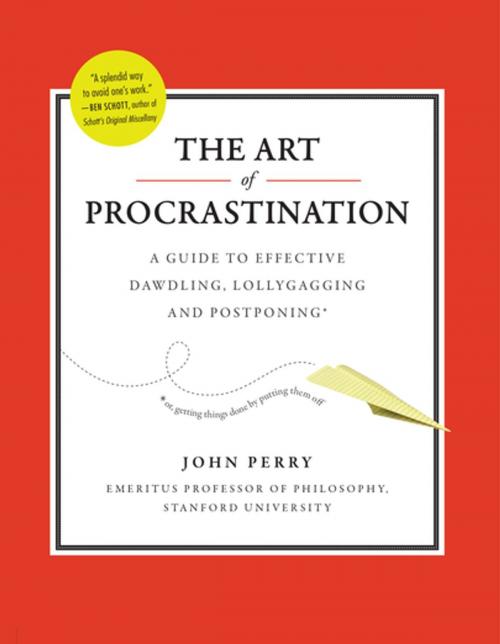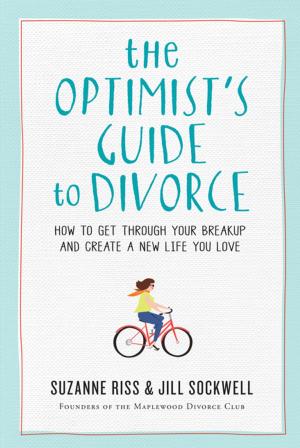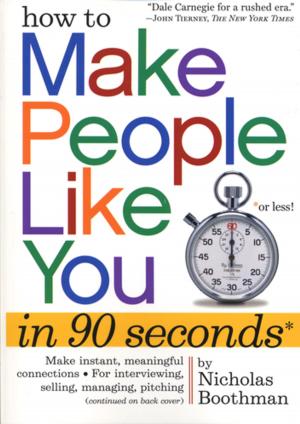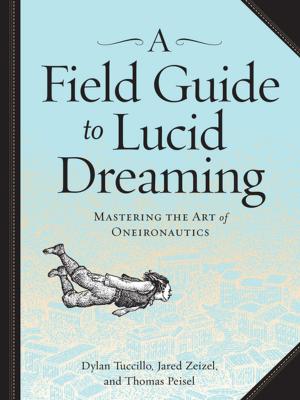The Art of Procrastination
A Guide to Effective Dawdling, Lollygagging and Postponing
Nonfiction, Health & Well Being, Psychology, Self Help, Self Improvement| Author: | John Perry | ISBN: | 9780761175001 |
| Publisher: | Workman Publishing Company | Publication: | August 28, 2012 |
| Imprint: | Workman Publishing Company | Language: | English |
| Author: | John Perry |
| ISBN: | 9780761175001 |
| Publisher: | Workman Publishing Company |
| Publication: | August 28, 2012 |
| Imprint: | Workman Publishing Company |
| Language: | English |
This is not a book for Bill Gates. Or Hillary Clinton, or Steven Spielberg. Clearly they have no trouble getting stuff done. For the great majority of us, though, what a comfort to discover that we’re not wastrels and slackers, but doers . . . in our own way. It may sound counterintuitive, but according to philosopher John Perry, you can accomplish a lot by putting things off. He calls it “structured procrastination”:
In 1995, while not working on some project I should have been working on, I began to feel rotten about myself. But then I noticed something. On the whole, I had a reputation as a person who got a lot done and made a reasonable contribution. . . . A paradox. Rather than getting to work on my important projects, I began to think about this conundrum. I realized that
I was what I call a structured procrastinator: a person who gets a lot done by not doing other things.
Celebrating a nearly universal character flaw, The Art of Procrastination is a wise, charming, compulsively readable book—really, a tongue-in-cheek argument of ideas. Perry offers ingenious strategies, like the defensive to-do list (“1. Learn Chinese . . .”) and task triage. He discusses the double-edged relationship between the computer and procrastination—on the one hand, it allows the procrastinator to fire off a letter or paper at the last possible minute; on the other, it’s a dangerous time suck (Perry counters this by never surfing until he’s already hungry for lunch). Or what may be procrastination’s greatest gift: the chance to accomplish surprising, wonderful things by not sticking to a rigid schedule. For example, Perry wrote this book by avoiding the work he was supposed to be doing—grading papers and evaluating dissertation ideas. How lucky for us.
This is not a book for Bill Gates. Or Hillary Clinton, or Steven Spielberg. Clearly they have no trouble getting stuff done. For the great majority of us, though, what a comfort to discover that we’re not wastrels and slackers, but doers . . . in our own way. It may sound counterintuitive, but according to philosopher John Perry, you can accomplish a lot by putting things off. He calls it “structured procrastination”:
In 1995, while not working on some project I should have been working on, I began to feel rotten about myself. But then I noticed something. On the whole, I had a reputation as a person who got a lot done and made a reasonable contribution. . . . A paradox. Rather than getting to work on my important projects, I began to think about this conundrum. I realized that
I was what I call a structured procrastinator: a person who gets a lot done by not doing other things.
Celebrating a nearly universal character flaw, The Art of Procrastination is a wise, charming, compulsively readable book—really, a tongue-in-cheek argument of ideas. Perry offers ingenious strategies, like the defensive to-do list (“1. Learn Chinese . . .”) and task triage. He discusses the double-edged relationship between the computer and procrastination—on the one hand, it allows the procrastinator to fire off a letter or paper at the last possible minute; on the other, it’s a dangerous time suck (Perry counters this by never surfing until he’s already hungry for lunch). Or what may be procrastination’s greatest gift: the chance to accomplish surprising, wonderful things by not sticking to a rigid schedule. For example, Perry wrote this book by avoiding the work he was supposed to be doing—grading papers and evaluating dissertation ideas. How lucky for us.















